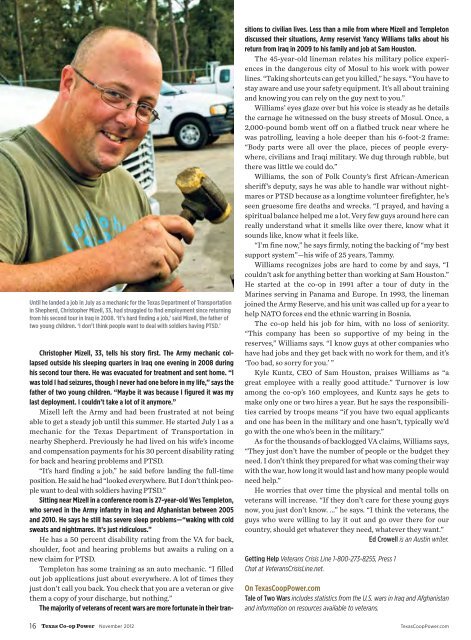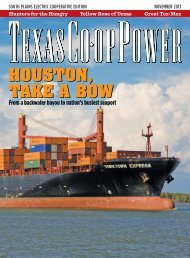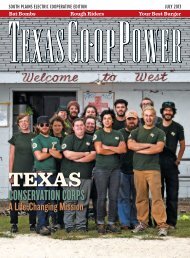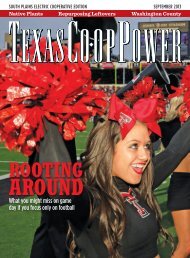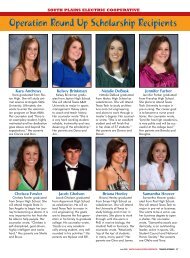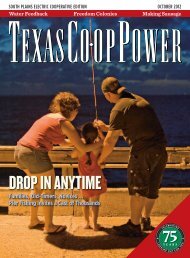November 2012PDF 5.57 MB - South Plains Electric Cooperative
November 2012PDF 5.57 MB - South Plains Electric Cooperative
November 2012PDF 5.57 MB - South Plains Electric Cooperative
You also want an ePaper? Increase the reach of your titles
YUMPU automatically turns print PDFs into web optimized ePapers that Google loves.
Until he landed a job in July as a mechanic for the Texas Department of Transportation<br />
in Shepherd, Christopher Mizell, 33, had struggled to find employment since returning<br />
from his second tour in Iraq in 2008. ‘It’s hard finding a job,’ said Mizell, the father of<br />
two young children. ‘I don’t think people want to deal with soldiers having PTSD.’<br />
Christopher Mizell, 33, tells his story first. The Army mechanic collapsed<br />
outside his sleeping quarters in Iraq one evening in 2008 during<br />
his second tour there. He was evacuated for treatment and sent home. “I<br />
was told I had seizures, though I never had one before in my life,” says the<br />
father of two young children. “Maybe it was because I figured it was my<br />
last deployment. I couldn’t take a lot of it anymore.”<br />
Mizell left the Army and had been frustrated at not being<br />
able to get a steady job until this summer. He started July 1 as a<br />
mechanic for the Texas Department of Transportation in<br />
nearby Shepherd. Previously he had lived on his wife’s income<br />
and compensation payments for his 30 percent disability rating<br />
for back and hearing problems and PTSD.<br />
“It’s hard finding a job,” he said before landing the full-time<br />
position. He said he had “looked everywhere. But I don’t think people<br />
want to deal with soldiers having PTSD.”<br />
Sitting near Mizell in a conference room is 27-year-old Wes Templeton,<br />
who served in the Army infantry in Iraq and Afghanistan between 2005<br />
and 2010. He says he still has severe sleep problems—“waking with cold<br />
sweats and nightmares. It’s just ridiculous.”<br />
He has a 50 percent disability rating from the VA for back,<br />
shoulder, foot and hearing problems but awaits a ruling on a<br />
new claim for PTSD.<br />
Templeton has some training as an auto mechanic. “I filled<br />
out job applications just about everywhere. A lot of times they<br />
just don’t call you back. You check that you are a veteran or give<br />
them a copy of your discharge, but nothing.”<br />
The majority of veterans of recent wars are more fortunate in their tran-<br />
16 Texas Co-op Power <strong>November</strong> 2012<br />
sitions to civilian lives. Less than a mile from where Mizell and Templeton<br />
discussed their situations, Army reservist Yancy Williams talks about his<br />
return from Iraq in 2009 to his family and job at Sam Houston.<br />
The 45-year-old lineman relates his military police experiences<br />
in the dangerous city of Mosul to his work with power<br />
lines. “Taking shortcuts can get you killed,” he says. “You have to<br />
stay aware and use your safety equipment. It’s all about training<br />
and knowing you can rely on the guy next to you.”<br />
Williams’ eyes glaze over but his voice is steady as he details<br />
the carnage he witnessed on the busy streets of Mosul. Once, a<br />
2,000-pound bomb went off on a flatbed truck near where he<br />
was patrolling, leaving a hole deeper than his 6-foot-2 frame:<br />
“Body parts were all over the place, pieces of people everywhere,<br />
civilians and Iraqi military. We dug through rubble, but<br />
there was little we could do.”<br />
Williams, the son of Polk County’s first African-American<br />
sheriff’s deputy, says he was able to handle war without nightmares<br />
or PTSD because as a longtime volunteer firefighter, he’s<br />
seen gruesome fire deaths and wrecks. “I prayed, and having a<br />
spiritual balance helped me a lot. Very few guys around here can<br />
really understand what it smells like over there, know what it<br />
sounds like, know what it feels like.<br />
“I’m fine now,” he says firmly, noting the backing of “my best<br />
support system”—his wife of 25 years, Tammy.<br />
Williams recognizes jobs are hard to come by and says, “I<br />
couldn’t ask for anything better than working at Sam Houston.”<br />
He started at the co-op in 1991 after a tour of duty in the<br />
Marines serving in Panama and Europe. In 1993, the lineman<br />
joined the Army Reserve, and his unit was called up for a year to<br />
help NATO forces end the ethnic warring in Bosnia.<br />
The co-op held his job for him, with no loss of seniority.<br />
“This company has been so supportive of my being in the<br />
reserves,” Williams says. “I know guys at other companies who<br />
have had jobs and they get back with no work for them, and it’s<br />
‘Too bad, so sorry for you.’ ”<br />
Kyle Kuntz, CEO of Sam Houston, praises Williams as “a<br />
great employee with a really good attitude.” Turnover is low<br />
among the co-op’s 160 employees, and Kuntz says he gets to<br />
make only one or two hires a year. But he says the responsibilities<br />
carried by troops means “if you have two equal applicants<br />
and one has been in the military and one hasn’t, typically we’d<br />
go with the one who’s been in the military.”<br />
As for the thousands of backlogged VA claims, Williams says,<br />
“They just don’t have the number of people or the budget they<br />
need. I don’t think they prepared for what was coming their way<br />
with the war, how long it would last and how many people would<br />
need help.”<br />
He worries that over time the physical and mental tolls on<br />
veterans will increase. “If they don’t care for these young guys<br />
now, you just don’t know. …” he says. “I think the veterans, the<br />
guys who were willing to lay it out and go over there for our<br />
country, should get whatever they need, whatever they want.”<br />
Ed Crowell is an Austin writer.<br />
Getting Help Veterans Crisis Line 1-800-273-8255, Press 1<br />
Chat at VeteransCrisisLine.net.<br />
On TexasCoopPower.com<br />
Tale of Two Wars includes statistics from the U.S. wars in Iraq and Afghanistan<br />
and information on resources available to veterans.<br />
TexasCoopPower.com


